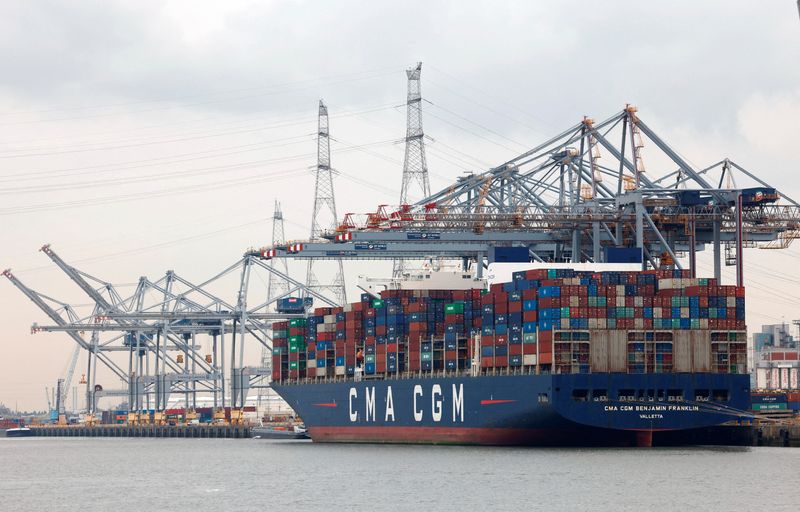(Reuters) - Iranian-backed Houthi militants in Yemen have stepped up attacks on vessels in the Red Sea, impacting a shipping route vital to East-West trade.
In response, some shipping companies have instructed vessels to instead sail around southern Africa, a slower and therefore more expensive route.
The U.S. and Britain launched dozens of air strikes against Houthi military targets overnight on Jan. 11 and 12, widening regional conflict stemming from Israel's war in Gaza.
Below are actions taken by companies (in alphabetical order):
C.H. ROBINSON
The global logistics group said on Dec. 22 it had rerouted more than 25 vessels around Africa over the previous week, and that number would likely grow.
"Blank sailings and rate increases are expected to continue across many trades into Q1 of 2024," it added.
CMA CGM
The French shipping firm said on Jan. 5 it had not changed its plans announced in December to gradually raise the number of vessels transiting through the Suez Canal.
It had previously rerouted several vessels via the Cape of Good Hope.
EURONAV
The Belgian oil tanker firm said on Dec. 18 it would avoid the Red Sea until further notice.
EVERGREEN
The Taiwanese container shipping line said on Dec. 18 its vessels on regional services to Red Sea ports would sail to safe waters nearby, while ships scheduled to pass through the Red Sea would be rerouted around Africa. It also temporarily stopped accepting Israeli cargo.
FRONTLINE
The Norway-based oil tanker group on Dec. 18 said its vessels would avoid the Red Sea and the Gulf of Aden.
GRAM CAR CARRIERS
The Norwegian auto carrier said on Dec. 21 its vessels were restricted from passing through the Red Sea.
HAFNIA
The Norwegian shipping firm said on Jan. 12 it has halted all ships heading towards or within the Bab al-Mandab Strait, following an advisory from the Combined Maritime Forces to stay clear of the region after the U.S.-British air strikes in Yemen.
HAPAG-LLOYD
The German container shipping line on Jan. 15 said it would continue to divert vessels away from the Suez Canal and around Africa. It will take next decisions on Jan. 22.
"We are not commenting on the specific incidents that occurred last night," a company spokesperson said on Jan. 12 regarding the U.S-British air strikes, adding Hapag-Lloyd welcomed measures to secure safe passage, as diversions have led to tens of millions of euros in additional monthly costs.
HMM
The South Korean container shipper said on Dec. 19 it had ordered its ships which would normally use the Suez Canal to reroute around Africa.
HOEGH AUTOLINERS
The Norwegian auto carrier said on Dec. 20 it would stop sailing via the Red Sea.
KLAVENESS COMBINATION CARRIERS
The Norway-based fleet operator said on Dec. 28 it was unlikely to sail any of its vessels in the Red Sea unless the situation improves.
KUEHNE + NAGEL
"Even if from today forward the Bab al-Mandeb Strait was to become safe and secure for transit, we expect it will take a minimum of two months before vessels could assume normal rotational patterns," Michael Aldwell, executive VP for sea logistics at the Swiss logistics firm, said on Jan. 12.
MAERSK
The Danish shipping group on Jan. 5 suspended Red Sea traffic "for the foreseeable future".
On Jan. 18, Maersk said the Red Sea disruptions and winter weather were causing congestion at container terminals, urging customers to pick up their units as soon as possible. It also started offering customers the option to shift some cargo from vessels to air freight at ports in Oman and the UAE.
A day earlier, its CEO said the Red Sea-related disruption to global shipping would likely last at least a few months.
Maersk said after the U.S.-British air strikes that it hopes international interventions and a larger naval presence in the area will eventually lead to a resumption of maritime commerce through the strait.
On Jan. 16, it sent two container ships through the Red Sea carrying goods for the U.S. military and government.
MSC
Mediterranean Shipping Company (MSC) said on Dec. 16 its ships would not transit through the Suez Canal.
NIPPON YUSEN
Japan's biggest shipper by sales suspended navigation through the Red Sea for all vessels it operates, a spokesperson told Reuters on Jan. 16. It has also instructed vessels near the Red Sea to wait in safe waters and is considering route change.
OCEAN NETWORK EXPRESS
Ocean Network Express, a joint venture between Japan's Kawasaki Kisen Kaisha, Mitsui O.S.K. Lines and Nippon Yusen, said on Dec. 19 it would reroute vessels from the Red Sea to the Cape of Good Hope or temporarily pause journeys and move to safe areas.
OOCL
The Hong Kong-headquartered container group said on Dec. 21 it had instructed its vessels to either divert their route away from the Red Sea or suspend sailing. It also stopped accepting cargo to and from Israel until further notice.
TORM
The Danish oil tanker group said on Jan. 12 it had decided to pause all transits through the southern Red Sea for now.
WALLENIUS WILHELMSEN
The Norwegian shipping group said on Dec. 19 it would halt Red Sea transits until further notice.

YANG MING MARINE TRANSPORT
The Taiwanese container shipping company said on Dec. 18 it would divert ships sailing through the Red Sea and the Gulf of Aden via the Cape of Good Hope for the next two weeks.